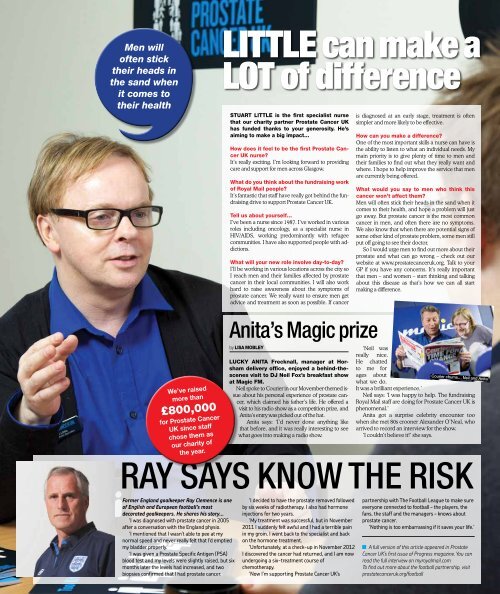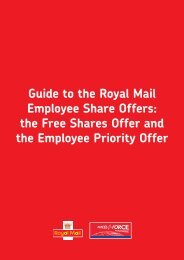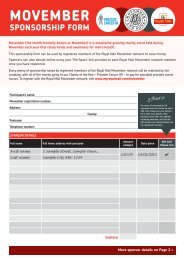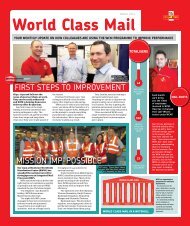letterboxParcels vpacketsCARSAffinity LeasingUp to 40% off a new car.User name: royal Password: MAILTel: 0845 057 5750Visit: www.affinityvehicleleasing.comHollyfield BenefitsDiscounts on car servicing, tyres orrepairs. Annual membership required.Quote: rmail01.Tel: 0845 130 6001Visit: www.roadserve.co.ukVauxhall Associate PartnersProgrammeDiscounts on a wide range of newVauxhall vehicles.Quote: RMGROUP.Visit: www.partnersprogramme.co.ukHEALTHbenenden healthHealthcare from £1.80 a week.Tel: 0800 414 8242Visit: www.benenden.co.uk/courierCS HealthcareBuild a healthcare plan to suit you.Tel: 0800 917 4325Visit: www.cshealthcare.co.ukSimplyhealthHelp with medical, optician and dentalcosts.Quote: CRO100.Tel: 0800 731 3486.Visit: www.simplyhealth.co.uk/royalmailROYAL MAIL PRODUCTSRedirection and KeepsafeTwo months’ Keepsafe and up to twoyears’ Redirection – free.To apply: Ask your managerSmilers stampsGet 10% off sets of Smilers (paperand telephone orders only).Quote: 11JHA.For more info, visit: www.royalmail.com/smilersSHOPPINGApple Employee PurchaseProgrammeUp to 17% off some gadgets.Visit: http://store.apple.com/uk/go/eppstore/royalmailstarlettersJOINTwinnersAfter reading Nick Landon’s contribution inyour February issue, I would like clarification onRoyal Mail products.I deliver letters, packets and very occasionally a parcel,although my colleagues in vans deliver a few more.Mr Landon informs us that packets are no more andthat we handle parcels. Royal Mail deciding to rebrand itsproducts is not in itself a problem as long as it is introducedwholesale and with clarity.My point is, I leave P739 cards advising customers thatthere is a ‘packet’ for them at the office, and Royal Mail has apricing structure that includes ‘letters, packets & parcels’.If Royal Mail only wants to deliver parcels and the oddletter, they should re-fashion the P739 cards and withdrawpackets from the pricing structure.Philip Padgett, postman, NewarkBunches flowersSave 10% on blooms by post.Quote: RMAILTel: 0800 626 249Visit: www.bunches.co.ukCycle2workSave tax and NI on a new bike.Username: rmguser. Password:rmgbenefit.Tel: 0845 077 8850Visit: www.cycle2work.net/employeeseFloristSave 15% off flowers with eFlorist.Quote: RM12Tel: 0808 161 1380Visit: efloristatwork.co.ukJoe BrownsGet 15% off men’s and women’sclothing.Quote: MAR916.Tel: 0113 270 6655Visit: www.joebrowns.co.ukKaspersky LabInternet security products for up to50% less.Quote: Royalmail25.Visit: www.kaspersky.co.uk/royalmailChangeon thecards?I’ve read in <strong>Courier</strong> thatwe are now meant to beusing ‘parcels’ as that’s whatcustomers are familiar with.Nick Landon went one stepfurther by stating we nolonger talk about packets.Does this mean Stroudoffice is using old stock P739cards, as we talk daily about‘packets’ to our customerseach time we deliver thesecards?I agree with using the wordparcels instead of packets, butif so, we need to remove allreference to the word fromour stationery.Rob, Stroud delivery officeNick Landon, MD of ourparcels business, replies toboth letters:We have indeed changed our productrange and pricing structure for parcels,as you’ll have heard. The changes camein on 2 <strong>April</strong>. Read more about this onpage 7.We have printed a new P739 card thatsays parcel instead of packet, togetherwith the rebranded Royal Mail Signed Forservice, which launched this month aspart of the parcels product changes.The new card was introduced on 2<strong>April</strong> and is being phased in, as andwhen stocks need replenishing, butwe don’t like to waste money so we’llreplace them as soon as the currentstock runs out.Money-saving offers and help when you need itKey: Employees onlySport & LEISUREAirport Parking & HotelsA 10% discount on parking at majorUK airports.Quote: RMAIL.Tel: 0844 871 7521.Visit: www.aph.com/rmailcottages4you10% off holiday lets.Quote: STAF10.Tel: 0845 268 1335Visit: http://www.cottages-4-you.co.uk/royalmailCSMA ClubDiscounts on leisure retreats, liveevents and motoring benefits.Visit: www.csmaclub.co.uk/royalmailgroupDavid Lloyd LeisureGym membership and free trials.Tel: 0844 848 4737Visit: www.davidlloyd.co.uk/employeeofferEnglish HeritageFree entry for colleagues and family toImage-consciousWhile I appreciate the need to save money,why do we have to hire plain white vans to fillgaps in our fleet?My delivery office has two at present.Customers don’t see the company image and Idon’t feel like I represent Royal Mail deliveringmail and parcels in a non-distinctive vehicle.Brian Williams, postman, Dunblanedelivery officeRichard Wiggins, head of commercial, Fleetand Maintenance Services, replies:We use hire vehicles for short-term fleet needs, suchBands on the runJust read your article “Reuse your bands.” Touse them once would be a bonus, but to usethem twice would be a miracle!The bands provided are of such lowquality, the suppliers must be rubbing theirhands that the Royal Mail buyers are sogullible.By the way, I take great pride in my walkbeing clear of spent bands, collecting any“strays” daily. I have reported the waste ofmoney to my line manager, but news neverseems to flow upwards.David Baxter, Slaithewaite delivery office,HuddersfieldPrice bandsOn reading in the February <strong>Courier</strong> about the10% reduction in rubber band use, it broughtback memories of when I (now retired) used towork in Accounts Payable more than 10 yearsago.I still remember one particular company,called Imporient, that Royal Mail paid asignificant amount to in a single financialyear just for rubber bands.It would be interesting to know how muchis now being spent on rubber bands.Christopher Jones, retired employeeEmployees and pensioners280 English Heritage sites by showinga work pass.Quote: EHCORPRM13.In addition, staff can claim 15%discount at English Heritage onlineand onsite shops.Visit: www.english-heritage.org.uk/support-us/corporate/corporatemembershipor intranet for a list offree-to-visit sites.HoseasonsDiscounts on holidays.Quote: mail.Tel: 0844 561 8502Visit: www.hoseasons.co.uk/royalmailHovertravel50% discount off standard adult andchild period returns, day returns andsingle tickets.Tickets only available on day ofpurchase at Hovertravel terminals.Company ID (Royal Mail pass)required to receive discountedfares. Discount eligible for the staffmember plus one and subject toavailability.Merlin EntertainmentUp to 55% off entry to topUK attractions.Quote: Royal Mail.Tel: 0871 222 4001as covering unserviceable vehicles or until a newpurpose-built red fleet vehicle is available to replacevehicles that have been written off. Hire vehicles oftenfill the gap while new programmes are being deployedor at times of seasonal demand such as Christmas.We are continuing to invest in new red fleet, andover the coming months you will see a substantialnumber of new replacement vehicles brought intoservice. This includes increasing the number ofreserve vehicles, and the first of these was deliveredin March.We are also looking at how we can replace vehiclesthat are written off faster – exploring a mixture of newvehicle financing and delivery options (that minimiseour spend) that would further increase the number ofvehicles that proudly feature our brand.Royal Mail on site gymsVisit: www.royalmailfitness.co.ukRoyal Mail Sports FoundationHelp with sports kit and training.Please email for further information.Tel: 0845 600 9665Email: sportsfoundation@royalmail.comShift into SportsContract-free, discounted fitnessfacilities.Quote: post2012.Visit: www.shiftintosports.com/royalmailgroupSUPPORT FOR YOUChildcare Voucher SchemeSave up to £904 per parent, per year.Quote: S462321D.Tel: 0800 612 9015Visit: www.kiddivouchers.comDisability HelplineFor disability-related issues.Geoff Hibberd, senior procurementmanager, assets and clothing, replies:David, it’s great to hear you are one of the manypostmen and women who take pride in keeping yourwalk clear of dropped bands. It is through your effortsthat we have managed to reduce the amount thecompany spends on replacing them. We could makefurther savings and improve our environment if everyonedid the same.Samples of the bands are tested to check they meetour specification and should all be suitable for reuse.There are two sizes of bands, and breakages can beprevented by using the right size band for the bundle.Christopher – we spend less now than we have inrecent years, but it’s still a lot – all the more reason tomake sure we reduce littering!Tel: 0800 028 6142 or throughRNID Typetalk and BT Text Direct.Email: disability.helpline@royalmail.comFeeling First ClassVisit: www.feelingfirstclass.co.ukPasscode: FFC1HELPFree 24-hour independent andconfidential advice for colleagues.Tel: 0800 688 8777Visit: www.rmghelp.co.ukPOOBIFinancial help for hard-pressedemployees with children.Tel: 020 7239 2295Visit: www.poobi.orgRowland Hill FundFor those in financial hardship.Tel: 0800 688 8777Visit: www.rowlandhillfund.orgVolunteer/fundraiser supportFor colleagues raising charity cash orvolunteering.Tel: 0151 284 1221All letters printed win a £25 One4All gift card, with a £50 gift card for eachmonth’s star letter. We try to include as many publishable letters aspossible, but due to space we are unable to publish all of them.Snow jokeOn Saturday 23 March, Leek Road, Stoke,we were informed that there would be nodeliveries.I’d walked to work and when I got homeI walked my dog. I had no problem walking.The majority of posties would have preferredto have gone out on delivery as opposed tobeing kept in the office until 1.10pm.It’s easier to walk on snow than on ice.On the Monday when there would bedouble mail, the snow would by then be ice.Why don’t management stop deliveriesin heavy rain? Mail gets soaked, visibility ispoor etc.The public complain about Royal Mailenough as it is, yet we give them morereasons to do so.John Isaac, Leek Road delivery officeShouldering the loadIt’s two years since we had our deliveryrevision at Littlehampton delivery office, andwe are now being told in team brief sessionsthat we can carry bags on our shoulders.Does this mean the revision that wasbrought in to take weight off our shouldersfor health and safety reasons has nowended? If this is the case, does this mean wewill soon be getting bikes back?I look at all Royal Mail publications andcannot see a single article about now beingable to carry bags on shoulders, so wouldlike to have some clarification on thismatter.I would also like to bring up a point aboutthe Walk Risk Assessment Platform (WRAP).Nearly two years after the revision we donot have the WRAP information on quite afew of the walks in our office. How has thishappened? We were told that our safetycomes first!Gary Burgess, postman, Littlehamptondelivery officeRichard Moor, delivery revisionprogramme manager, replies:One of the primary objectives of the deliverymodernisation programme is, as you say, to takeweight off the shoulders of our people throughnew delivery methods like the high capacity andlightweight trolleys. The change is vital as it helpsus deliver the increasing volume of parcels, our keygrowth area, in a safe and secure way.Once an office has deployed the new methods,they should always be used. New delivery roundsare planned on the basis of using the appropriatemethods – so reverting to other approaches will notbe as effective or efficient, and does not represent thesafest option.Walk Risk Assessments are a core ‘business asusual’ standard. They are reviewed and updated aspart of the revision process, but all offices must havethe appropriate risk assessment documentation inplace and maintain it. For individual delivery walks,this may be a standalone document or incorporatedas part of the walk log documentation. Any personperforming a delivery needs to have access to the riskassessment and walk log information associated withit, so they can deliver safely and securely.I will pass on the points you have raised, but pleasecontinue to work with your local delivery and safetyteams to ensure standards are met and maintained.Shaun Davis, Group director of safety,health and wellbeing, replies:It’s about being responsible employers and valuing ourpeople’s safety.Walking to work and walking the dog is differentto using a trolley or handling mail. Footpaths androadways are usually cleared or salted or havealready had traffic going through, so snow is less ofan issue – this is not always the case when walkingup the path to a customer’s property.Managers must take individual decisions based ona local risk assessment. There’s no one size fits all asconditions will be different at different locations. Ofcourse we ask managers to be sensible, as you say, butwe don’t take chances – we err on the side of caution.Safety is our number one priority.Our focus is the safety of our people while deliveringmail. The severe weather risk assessment is not justfor use in snow and ice – it can be used for a variety ofweather conditions, for example in sun, heavy rain andhigh winds. So while mail may get wet, the priority is tolocally assess whether it is safe to make the journey.No time tokeep upRoyal Mail andParcelforce are so farbehind thecompetition intechnology that theyhave not got ‘severalyears’ to bring in 100%tracking on parcels, asNick Landon suggestswill be needed in February’s <strong>Courier</strong>.If I order anything online and one ofthe competition delivers it, I’m sent anemail telling me which day it will arrive,and sometimes given an hour slot forthat delivery.If Royal Mail delivers it, I receivean email that says it will be deliveredin three to five days. The longerthis disparity goes on, the less likelycompanies will use Royal Mail to delivertheir goods.Alan Bishop, retired employeeNick Landon, managing director ofour parcels business, replies:Parcelforce Worldwide already tracks all parcelsand has text messaging and email capability thatmatches the best of the competition. In RoyalMail, we already have this with Royal Mail Trackedand will have on Special Delivery this year.For the rest of our parcels, we handle as manyas every other UK carrier put together, so it will takesome time to design and build the systems that cancope with that many parcels.We also deal with far more customers thanother carriers; Hermes, for example, has around120 business customers, whereas we havehundreds of thousands of customers we will needto convert to using the new systems.However, we’re starting now and will do this asquickly as possible. In the meantime, we are stillgrowing faster than the market. Tracking all parcelswill help us to grow even faster, but we want tomake sure that our systems are right first. We’llonly get one chance to impress our customers; it’sall too easy to lose customers by rushing new ITdeployment, as many other carriers have found out,so we will do this in a controlled way.LETTERBOXEmailcourierletters@abcomm.co.ukwrite to <strong>Courier</strong> letters,24-26 Great Suffolk Street,LONDON SE1 0UETEXT COURIER TO 80800(MAX 160 CHARACTERS)Please include your homeaddress with your letterYou said,please make yourletter no more than100 words and aboutone clear topicthey actedFollowing your feedback we will update you on some of theissues you’ve raised in previous lettersIn the driving seatGlaisdale postman Brian Wagstaff asked abouttorn drivers’ seats in a lot of vans.Head of commercial, Fleet and MaintenanceServices, Richard Wiggins provides an update:‘The wear is from the constant loading/unloading on the seat cushion from the highnumber of stops and starts.‘We have advised all our vehicle service centresabout the issue and how to test for it – not justrips and tears, but also foam in the seats that’sbecome flattened and offers reduced support.‘We’ve made sure that our suppliers haveparts available for any affected vehicles, andthat our maintenance checks specificallyinclude this when vehicles come in for aservice.’Keep on improvingIn December 2012, our star letter included a suggestionfrom Nottingham postman Adie Jackson. Adie suggestedcarrying cards telling customers about our Keepsafeservice that postmen and women could pop through thedoor of properties where mail is left unattended.Basirat Bello, regulated services product manager,says: ‘This is a great idea and I am keen to action it.We are putting it into early development this month,although what comes out of this project might vary fromthe original suggestion. It’s early days, but it is beingtaken forward and we’ll be able to feed back once theidea goes before the Operations Change Control board.’Assessing the awardsIn the January <strong>2013</strong> issue, Ian Barnesfrom Sheffield mail centre wrote into praise the National Safe DrivingAwards scheme we’re piloting with theRoyal Society for the Prevention ofAccidents (RoSPA). It’s being trialled atseveral locations in the West region.Lisa Durrant, head of fleet safetyand compliance, West region, says: ‘Wewant to demonstrate real benefits overa period of time, so at this point we’restill at the pilot stage. I’ll be looking atthe benefits and statistics, and takingfeedback from drivers, in the comingmonths, so <strong>Courier</strong> will keep youupdated on progress.’Ragout to come
Men willoften sticktheir heads inthe sand whenit comes totheir healthLit tle can make alot of differenceStuart Little is the first specialist nursethat our charity partner Prostate Cancer UKhas funded thanks to your generosity. He’saiming to make a big impact…How does it feel to be the first Prostate CancerUK nurse?It’s really exciting. I’m looking forward to providingcare and support for men across Glasgow.What do you think about the fundraising workof Royal Mail people?It’s fantastic that staff have really got behind the fundraisingdrive to support Prostate Cancer UK.Tell us about yourself…I’ve been a nurse since 1987. I’ve worked in variousroles including oncology, as a specialist nurse inHIV/AIDS, working predominantly with refugeecommunities. I have also supported people with addictions.What will your new role involve day-to-day?I’ll be working in various locations across the city soI reach men and their families affected by prostatecancer in their local communities. I will also workhard to raise awareness about the symptoms ofprostate cancer. We really want to ensure men getadvice and treatment as soon as possible. If canceris diagnosed at an early stage, treatment is oftensimpler and more likely to be effective.How can you make a difference?One of the most important skills a nurse can have isthe ability to listen to what an individual needs. Mymain priority is to give plenty of time to men andtheir families to find out what they really want andwhere. I hope to help improve the service that menare currently being offered.What would you say to men who think thiscancer won’t affect them?Men will often stick their heads in the sand when itcomes to their health, and hope a problem will justgo away. But prostate cancer is the most commoncancer in men, and often there are no symptoms.We also know that when there are potential signs ofsome other kind of prostate problem, some men stillput off going to see their doctor.So I would urge men to find out more about theirprostate and what can go wrong – check out ourwebsite at www.prostatecanceruk.org. Talk to yourGP if you have any concerns. It’s really importantthat men – and women – start thinking and talkingabout this disease as that’s how we can all startmaking a difference.We’ve raisedmore than£800,000for Prostate CancerUK since staffchose them asour charity ofthe year.Anita’s Magic prizeby LISA MOBLEYLucky Anita Frecknall, manager at Horshamdelivery office, enjoyed a behind-thescenesvisit to DJ Neil Fox’s breakfast showat Magic FM.Neil spoke to <strong>Courier</strong> in our Movember-themed issueabout his personal experience of prostate cancer,which claimed his father’s life. He offered avisit to his radio show as a competition prize, andAnita’s entry was picked out of the hat.Anita says: ‘I’d never done anything likethat before, and it was really interesting to seewhat goes into making a radio show.‘Neil wasreally nice.He chattedto me forages aboutwhat we do.It was a brilliant experience.’Neil says: ‘I was happy to help. The fundraisingRoyal Mail staff are doing for Prostate Cancer UK isphenomenal.’Anita got a surprise celebrity encounter toowhen she met 80s crooner Alexander O’Neal, whoarrived to record an interview for the show.‘I couldn’t believe it!’ she says.<strong>Courier</strong> chums… Neil and AnitaRay says know the riskFormer England goalkeeper Ray Clemence is oneof English and European football’s mostdecorated goalkeepers. He shares his story…‘I was diagnosed with prostate cancer in 2005after a conversation with the England physio.‘I mentioned that I wasn’t able to pee at mynormal speed and never really felt that I’d emptiedmy bladder properly.‘I was given a Prostate Specific Antigen (PSA)blood test and my levels were slightly raised, but sixmonths later the levels had increased, and twobiopsies confirmed that I had prostate cancer.‘I decided to have the prostate removed followedby six weeks of radiotherapy. I also had hormoneinjections for two years.‘My treatment was successful, but in November2011 I suddenly felt awful and I had a terrible painin my groin. I went back to the specialist and backon the hormone treatment.‘Unfortunately, at a check-up in November 2012I discovered the cancer had returned, and I am nowundergoing a six-treatment course ofchemotherapy.‘Now I’m supporting Prostate Cancer UK’spartnership with The Football League to make sureeveryone connected to football – the players, thefans, the staff and the managers – knows aboutprostate cancer.‘Nothing is too embarrassing if it saves your life.’A full version of this article appeared in ProstateCancer UK’s first issue of Progress magazine. You canread the full interview on <strong>myroyalmail</strong>.comTo find out more about the football partnership, visitprostatecanceruk.org/football
















